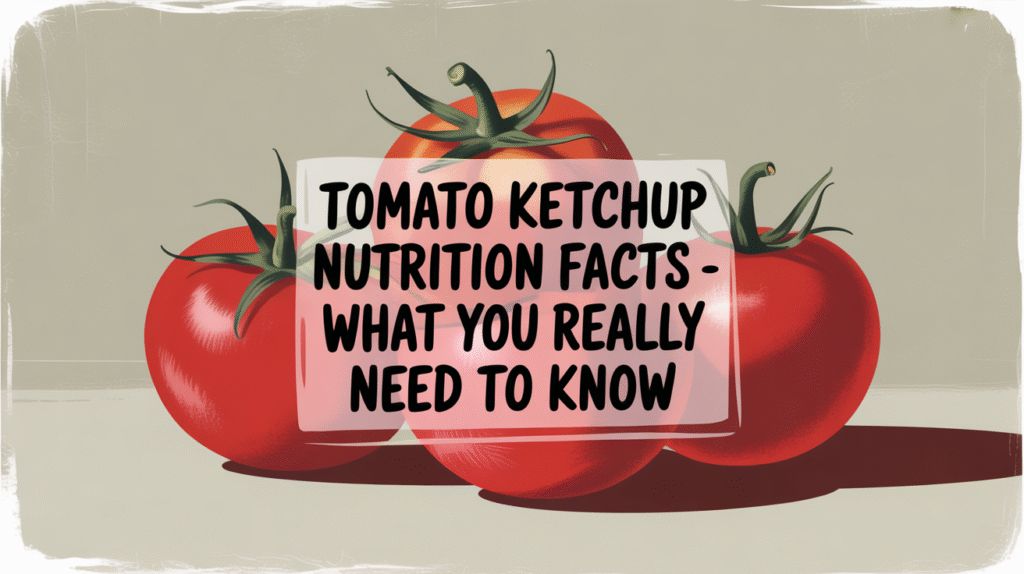Affiliate Disclosure: PantryBrands.co.uk is a participant in the Amazon.co.uk Associates Programme. As an Amazon Associate, we earn from qualifying purchases made through links on this site.
Tomato ketchup is low in fat and calories, but it contains added sugar and salt, which are important to consider in a balanced diet. While it’s often thought of as a simple condiment, understanding its nutritional makeup helps you make smarter choices — especially if you use it frequently.

This article explores the full nutritional profile of tomato ketchup, including calories, carbohydrates, sugar content, and how it fits into a healthy lifestyle.
What’s in Tomato Ketchup?
Tomato ketchup is typically made from tomatoes, vinegar, sugar, salt, and a blend of spices. These ingredients give ketchup its signature sweet-and-tangy flavour — but they also determine its nutritional impact.
Common Ingredients Found in Tomato Ketchup
While different brands may have slight variations, these are the usual components of store-bought ketchup:
- Tomato concentrate or purée – Often from ripe tomatoes or tomato paste.
- Vinegar – Usually spirit vinegar, which adds acidity and acts as a preservative.
- Sugar or glucose-fructose syrup – Provides sweetness but increases calorie count.
- Salt – Enhances flavour and preserves the sauce.
- Spices and flavourings – Typically garlic powder, onion powder, cloves, or allspice.
Key Nutritional Facts per Serving
A standard serving of tomato ketchup is one tablespoon (around 15g). Here’s what you’ll typically get in that amount:
Macronutrients in One Tablespoon (15g)
Most major UK brands like Heinz or Tesco offer similar nutrition profiles:
- Calories: 15–20 kcal
- Carbohydrates: 4–5g
- Sugars: 3–4g
- Fat: 0g
- Protein: 0g
- Salt: 0.2–0.3g
Although it seems insignificant, using multiple servings in one meal can double or triple your sugar and sodium intake.
How Sugar in Ketchup Affects Health
The biggest concern for many people is the sugar content. While a tablespoon doesn’t seem like much, ketchup is often used in larger quantities.
Why the Sugar Matters
Even small amounts of added sugar can add up over time. Consider the following:
- Regular ketchup contains around 1 teaspoon of sugar per tablespoon.
- High intake of added sugars is linked to weight gain, tooth decay, and increased risk of type 2 diabetes.
- Many people don’t account for condiments when tracking sugar consumption.
For those on a low-sugar diet, it’s worth switching to reduced-sugar ketchup or using it sparingly.
Salt Content in Tomato Ketchup
Ketchup isn’t typically seen as a salty food, but its sodium content can be notable, especially for people watching their blood pressure.
Hidden Sodium in Condiments
Here’s how salt in ketchup can influence your diet:
- Just 2 tablespoons can contain over 10% of the NHS daily salt recommendation.
- Regular ketchup ranges between 0.2g and 0.4g of salt per tablespoon.
- Excess salt consumption is associated with high blood pressure and cardiovascular risks.
If you use ketchup often, switching to low-salt varieties can make a significant difference over time.
Low-Sugar and Low-Salt Alternatives
To cater to health-conscious consumers, several brands now offer healthier ketchup variants.
Popular Low-Sugar Ketchup Brands in the UK
If you’re watching your sugar intake, try these options:
- Heinz No Added Sugar & Salt – A reduced version of the classic, sweetened with stevia.
- Stokes Reduced Sugar Ketchup – Uses fewer sweeteners and more tomatoes.
- Hunter & Gather Unsweetened Ketchup – Made without sugar or artificial additives.
These options still provide the familiar ketchup taste, without the extra sugar or salt.
How Tomato Ketchup Fits into a Balanced Diet
While not unhealthy in small amounts, ketchup should be seen as a treat or flavour enhancer, not a primary source of nutrients.
Nutritional Positives and Negatives
Here’s how ketchup compares:
- Positives:
- Low in fat and cholesterol-free.
- Contains small amounts of lycopene, an antioxidant found in tomatoes.
- Negatives:
- High in added sugar.
- Moderate sodium content.
- Contains minimal fibre or protein.
If used in moderation, ketchup can be part of a healthy diet. Just be mindful of portion sizes and frequency.
FAQs About Tomato Ketchup Nutrition Facts
Here are some questions and answers about the nutritional content of tomato ketchup and its impact on your health.
Is tomato ketchup high in sugar?
Yes, regular ketchup contains around 3–4g of sugar per tablespoon, mostly from added sweeteners like glucose-fructose syrup.
Is tomato ketchup fattening?
Ketchup is not high in fat and contains relatively few calories, but excessive use may contribute to calorie and sugar overload.
Does tomato ketchup contain any nutrients?
It contains small amounts of lycopene (an antioxidant), but not enough essential vitamins or minerals to be considered nutritious on its own.
Is it okay to eat ketchup every day?
Occasional use is fine, but regular high consumption — especially of standard ketchup — may lead to excessive sugar and salt intake.
What’s the healthiest ketchup option?
The healthiest options are those with no added sugar or salt, such as Heinz No Added Sugar & Salt or Hunter & Gather Unsweetened Ketchup.
